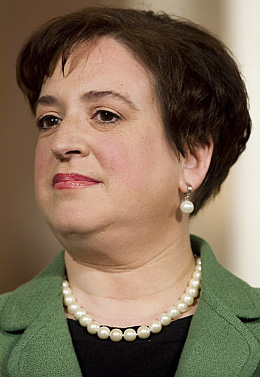
WASHINGTON (BP)–With Elena Kagan’s Senate Judiciary Committee hearing set to begin Monday, conservative groups are pushing back against the media storyline that says President Obama’s Supreme Court nominee is a blank slate on hot-button social issues.
Americans United for Life has helped lead the charge, arguing that Kagan — Obama’s solicitor general — has a history of speeches and writings that strongly hint she will be a left-leaning judge who supports abortion rights and other liberal causes. Americans United for Life held a conference call with reporters Wednesday during which Robert Bork, whose 1987 Supreme Court nomination was defeated, took questions.
Bork, who opposes the nomination, said if Kagan has an ideology similar to her judicial heroes, “You’ll have a court that is much more to the left than we have today.”
William Saunders, senior vice president of legal affairs with Americans United for Life, said the record on Kagan is clear.
“It’s true that Kagan does not have a record as extensive as she would have if she were a sitting judge who had issued hundreds of legal opinions,” Saunders said. “However, she has written some law review articles, she has given some speeches, she has done some other things that we think … give important clues to the kind of justice she would be.
“We’re very concerned that she is quite extreme on the abortion issue and that she would be an agenda-driven judge.”
Kagan would replace Justice John Paul Stevens, a leading liberal on the court. The question is whether Kagan is even more liberal than Stevens was. Among their concerns, conservative groups have pointed to:
— Kagan’s praise for former Israel Supreme Court Judge Aharon Barak, whom Bork calls the “most activist” judge on the planet. During a 2006 awards ceremony for Barak at Harvard, Kagan, then dean of the Harvard Law School, called Barak her “judicial hero” and described him as the one judge in her lifetime “whom, I think, best represents and has best advanced the values of democracy and human rights, of the rule of law and of justice.” In his book “The Judge in a Democracy,” Barak wrote, “The judge may give a statute a new meaning, a dynamic meaning, that seeks to bridge the gap between law and life’s changing reality without changing the statute itself. The statute remains as it was, but its meaning changes, because the court has given it a new meaning that suits new social needs.”
— Her past financial support for the National Partnership for Women and Families, an organization that, on its website, prominently states that one of its goals it to expand “reproductive rights” and “give every woman” access to “abortion services.”
— Her clerkship for former Supreme Court Justice Thurgood Marshall, who supported legalized abortion and taxpayer-funded abortion. He voted with the majority in Roe v. Wade.
— Her urging of President Clinton to support a watered-down compromise Senate bill — sponsored by then-Sen. Tom Daschle — that would have siphoned votes from a bill banning partial-birth abortion. Clinton vetoed the partial-birth bill. “We recommend that you endorse the Daschle amendment in order to sustain your credibility on HR 1122 and prevent Congress from overriding your veto,” the memo, from Kagan and her boss, Bruce Reed, said. Both Kagan and Reed, though, thought the Daschle bill — and by extension the partial-birth bill — were unconstitutional. She was a domestic policy advisor to Clinton. Pro-life groups opposed the Daschle bill.
— Her criticism of the Supreme Court decision in Rust v. Sullivan, a 1991 case in which the court upheld federal regulations barring federally funded health clinics from discussing or referring abortions.
— Her criticism of the military’s Don’t Ask, Don’t Tell policy. “I believe the military’s discriminatory employment policy is deeply wrong — both unwise and unjust,” she wrote in a 2005 e-mail to Harvard students, according to The Harvard Crimson newspaper. She also signed a legal brief that asked the Supreme Court to overturn the Solomon Amendment, a law which allows the federal government to bar funds to universities that refuse to allow military recruiters on campus. Harvard and other colleges wanted to refuse the recruiters because of the military’s policy on homosexuals. But the Supreme Court in 2006 unanimously upheld the Solomon Amendment, 8-0.
Bork said a judge’s view of abortion rights gives an indication of the judge’s other views.
“For example, a judge who makes it a constitutional right to abortion almost certainly will decide that there’s a constitutional right to same-sex marriage,” Bork said. “There’s a whole syndrome of things that comes with the willingness to [find] values that are not in the Constitution.”
President Obama, speaking April 21, made clear he wanted to nominate someone who backed abortion rights.
“I will say that I want somebody who is going to be interpreting our Constitution in a way that takes into account individual rights, and that includes women’s rights. And that’s going to be something that’s very important to me, because I think part of what our core constitutional values promote is the notion that individuals are protected in their privacy and their bodily integrity, and women are not exempt from that,” Obama said, using phrases identified with the abortion movement.
–30–
Michael Foust is an assistant editor of Baptist Press.

















